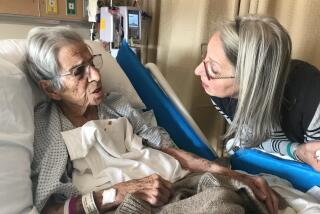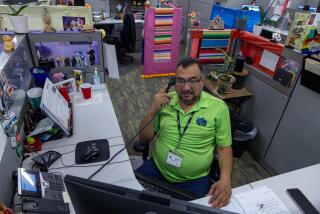SOUTHERN CALIFORNIA CAREERS / PART-TIME CAREERS : Stepping Off the Full-Time Track : Flexible Work Schedules Allow Workers to Balance Their Lives While Thriving at Work : Bill Rosenfeld & Anne Pearl: UC San Francisco Medical Center
- Share via
Four years ago, Bill Rosenfeld recognized the classic signs of burnout in himself. Bouts of depression. Sagging energy. Distraction.
Rosenfeld, who had already changed professions twice, wanted desperately to save his seven-year career as a counselor to cancer patients, but he knew he could no longer work long, unfettered hours in such an emotionally and physically draining field.
He decided to pursue a novel idea: job sharing.
At the hospital where he works, UC San Francisco Medical Center, Rosenfeld’s supervisors jumped at the chance. Here was an opportunity to keep highly skilled social workers in a career that suffers an incredibly high burnout rate: Most counselors helping patients with devastating diseases succumb to the stress and seek a new job within a few years.
After an exacting search for a suitable partner, Rosenfeld paired with social worker Anne Pearl, creating what both describe as a dream team. They share responsibility for several dozen patients, perfecting what they call “serial counseling”--offering people in crisis the energy, compassion and dedication of two counselors wrapped into one.
“The reason we wanted to job-share is because the intensity of working with cancer patients is so great you need to have a life on the side,” said Pearl, 52, a social worker for 20 years. “Job sharing allows me to get intimate with (patients) and have the pain of sharing their pain, but to be able to have some time away so I can replenish myself and have the emotional energy to put back into the job.”
Although they rarely work at the same time, Pearl and Rosenfeld have formed a strong bond of respect and trust, becoming so close that they often finish each other’s sentences.
“When it comes to job share, it needs to work in the heart as well as in the head,” Rosenfeld said. “Trust is a key word. When I walk away from the hospital, I know that patients will be well taken care of by Anne.
“The concept of commitment is absolutely critical too,” he said. “You have to suspend your own ego sometimes. It has to be a very, very careful matchup. Like an arranged marriage.”
But Rosenfeld’s and Pearl’s experience also illustrates what can be a major drawback of job sharing: the pain of separation.
Pearl was laid off last week--the result of her relatively low seniority during massive cost cutting at the UC hospital. She is classified as a part-timer, and her four years of employment at the hospital was technically considered only two years, so she lost her job to another social worker who had worked there longer.
Both Pearl and Rosenfeld are heartbroken. Pearl is searching for a new job, while Rosenfeld is facing the challenge of seeing whether the shared arrangement will work with a new partner. “I haven’t gone through anything like this since I was divorced,” he said.
Colleagues in the cancer ward are also distressed by the loss of what they consider a dynamic duo. Their supervisor, Sylvia Barroso, struggled for months to find ways to keep them intact. Finally, though, an outdated personnel policy--written before innovations such as job sharing existed--won out. They learned the hard way that details of seniority should be worked out before accepting a shared-job arrangement.
Despite their forced breakup, their unique blend of skills exemplified how a company can benefit from job sharing in a highly specialized and demanding field. Pearl, a counselor for two decades, excels at meeting the emotional needs of patients and their families. Rosenfeld, a former attorney and teacher, is especially skilled at working the system, whether it’s arranging visas or negotiating deals with health insurers.
“My feeling is the patients get much more from us than they ever did from me, “ Rosenfeld said. “What we found is that patients will pick from us those things that are our strengths.”
Communication is vital to job sharing, and Pearl and Rosenfeld communicated through phone calls and computer disks, updating each other at the end of each shift with a report on the progress and needs of the patients.
As with most job sharers, they worked several hours more than the 20 per week their salaries were based on. Both say the trade-off has been well worth it.
Pearl could hike, travel and spend time with her college-age daughter. Rosenfeld has more time for his four children, three stepchildren and 10 grandchildren, as well as for volunteer work in an organization that helps grass-roots groups pursue social causes.
More to Read
Sign up for Essential California
The most important California stories and recommendations in your inbox every morning.
You may occasionally receive promotional content from the Los Angeles Times.










